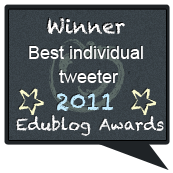This is a post that has been brewing for a while now....
But after a conversation I had this weekend I think it's time to get some of my thoughts out there for reflection.
I totally get passion in education. And really can you be an educator and not have passion for education? Perhaps that is a post for another time.
But the way I see it, many have moved passed passion and moved to anger.
Again, I totally get that. I am upset with many things in our current system. Sure, if asked, I would give a lot of the "reformers" a piece of my mind.
But...
It seems like if you disagree with one side or the other you are perceived as dumb, stupid, or much, much worse.
My conversation started out with a Tweet that (to paraphrase) asked if a certain, central figure in the reform debate, that many admire and look up to actually had any ideas or if she just ran around the country telling us what is wrong without actually offering up any ideas. I follow this "reformer" on Twitter and her stream is filled with what comes across in 140 characters as anger. Again, I get that. (Remember, I am angry too.) But my point was that when you had the audience she did last week why not give them something tangible to take back to their districts to try or do? Seems reasonable, right?
Normally I don't tweet things like that. I don't. I like the discussion but there are people out there in ol' Twitter land that use the screen as one of anonymity and they believe because they are behind this screen they can say and do whatever they like. Don't get me wrong. Again, I love the conversations. I totally enjoy for my thinking to be pushed. However I have limits....
So after my tweet, which I figured would draw some comments I got plenty of, "I agrees," and a few people who disagreed, which was great. I had fun engaging and talking to them. Then there was one who, has passion, but that passion has grow to anger. And if you cross them, say anything negative about the reformer whom I mentioned earlier, well, you might as well pack up and go home.
This tweeter had solid arguments for certain types of reform and the direction we should be going, many I agreed with. However, it was the personal attacks and just general poor language that really made me loose respect for this tweeter.
Disagreement is cool. Makes us think differently and see other sides, but to move from disagreement to creative hashtags, none appropriate to even write here, really just make your arguments look weak.
This isn't the first time I have written about this or even encountered it. In a post from late last year I wrote about Education Nation project from NBC and how it was getting all sorts of negative attention from the Twittevers and blogsphere. Again, there I tried to say we needed to move from talk to action.
In my most popular post ever on this blog I wrote about why we should all think before we Tweet.
For me I keep coming back to this idea that I believe people who use social media or tools like it feel some level of anonymity and they can say, really what ever. What if we were having a face-to-face conversation? Would the person who I had my conversation with this past weekend behaved the same and said the same things? I am doubtful.
I am not the only one to notice this trend. My friend Michelle, just wrote a post today about the exact same issue. In it she says;
- PLAY NICELY.
- If you disagree, you can do so without attacking another person’s character.
- If you wouldn’t say it in person, don’t type it online.
- Remember, there are human beings on the other end.
- Remember, you are also a human being.
- Rule #1 is really all you need.










